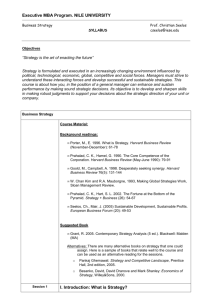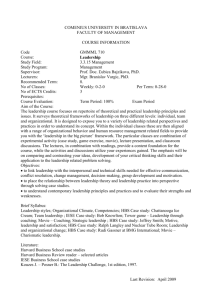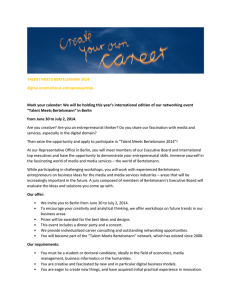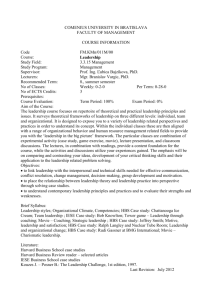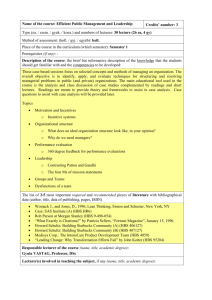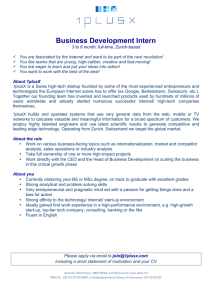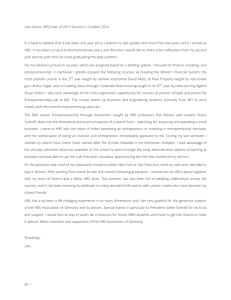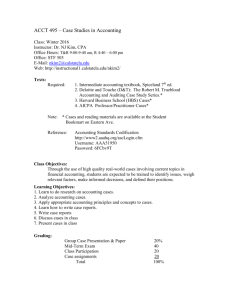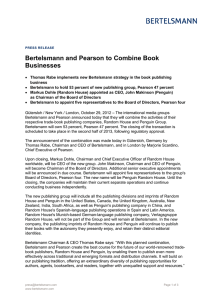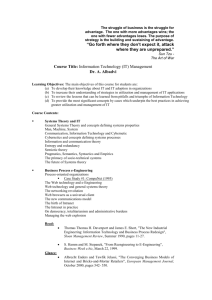Competitive and Corporate Strategy
advertisement
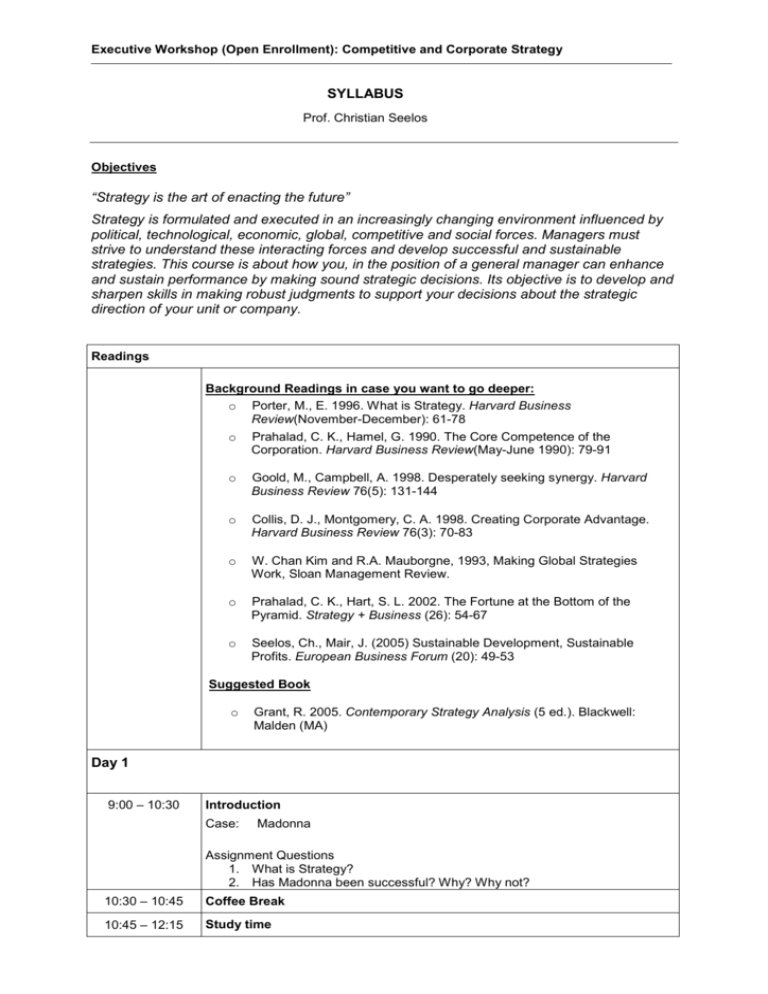
Executive Workshop (Open Enrollment): Competitive and Corporate Strategy SYLLABUS Prof. Christian Seelos Objectives “Strategy is the art of enacting the future” Strategy is formulated and executed in an increasingly changing environment influenced by political, technological, economic, global, competitive and social forces. Managers must strive to understand these interacting forces and develop successful and sustainable strategies. This course is about how you, in the position of a general manager can enhance and sustain performance by making sound strategic decisions. Its objective is to develop and sharpen skills in making robust judgments to support your decisions about the strategic direction of your unit or company. Readings Background Readings in case you want to go deeper: o Porter, M., E. 1996. What is Strategy. Harvard Business Review(November-December): 61-78 o Prahalad, C. K., Hamel, G. 1990. The Core Competence of the Corporation. Harvard Business Review(May-June 1990): 79-91 o Goold, M., Campbell, A. 1998. Desperately seeking synergy. Harvard Business Review 76(5): 131-144 o Collis, D. J., Montgomery, C. A. 1998. Creating Corporate Advantage. Harvard Business Review 76(3): 70-83 o W. Chan Kim and R.A. Mauborgne, 1993, Making Global Strategies Work, Sloan Management Review. o Prahalad, C. K., Hart, S. L. 2002. The Fortune at the Bottom of the Pyramid. Strategy + Business (26): 54-67 o Seelos, Ch., Mair, J. (2005) Sustainable Development, Sustainable Profits. European Business Forum (20): 49-53 Suggested Book o Grant, R. 2005. Contemporary Strategy Analysis (5 ed.). Blackwell: Malden (MA) Day 1 9:00 – 10:30 Introduction Case: Madonna Assignment Questions 1. What is Strategy? 2. Has Madonna been successful? Why? Why not? 10:30 – 10:45 Coffee Break 10:45 – 12:15 Study time 12:15 – 13:45 Lunch 13:45– 15:15 Industry Value System Cases: Apple Computer 2002 (HBS 9-702-469) Apple Computer 2004 (HBS 9-704-46) Summary: "Think Differently" has been Apple's motto. In this case we will discuss the history of Apple and how their position has changed over time. Can Apple survive in the current world dominated by the PC and Wintel platform? Assignment Questions 1. Historically, what were Apple’s major competitive advantages? 2. Analyze the structure of the personal computer industry over the last 10 years. How have the dynamics of the PC industry changed? 3. Evaluate Apple’s strategy since 1990. 4. Has Steve Jobs “solved” the problem? What should Steve Jobs do today? 15:15 – 15:30 Coffee Break 15:30 – 17:00 Competitive Advantage: Positioning and Sustainability I Case: Ducati (HBS 9-701-132) Summary: Ducati is a real success story when talking about strategic turnarounds. The real challenge for Ducati today is how to sustain the competitive advantage they achieved during this turnaround. Assignment Questions 1. What is Ducati’s competitive advantage based on? 2. Can this advantage sustain growth? 3. What are the alternatives for the future? Day 2 9:00 – 10:30 Competitive Strategy: Synthesis and Discussion Lecture 10:30 – 10:45 Coffee Break 10:45 – 12:15 Study time 12:15 – 13:45 Lunch 13:45 – 15:15 Going International Cases: Antmobel A (HBS 9-795-100) Antmobel B (HBS 9-795-101) Summary: In the midst of a sales slump brought on by a recession in Spain, Antmobel's managers are presented with an opportunity to sell a substantial quantity of furniture in Uzbekistan. Management must decide whether the order fits with the company's strategy, capabilities, and internationalization plans. Assignment Questions 1. Should Antmobel accept the order of Uzbekistan or should it invest in France? 2. Should Antmobel be attempting to go international? 15:15 – 15:30 Coffee Break 15:30 – 17:00 Global Strategy in Action 2 Going International with a medium-sized company Guest speaker Day 3 9:00 – 10:30 Corporate Strategy Lecture 10:30 – 10:45 Coffee Break 10:45 – 12:15 Study time 12:15 – 13:45 Lunch 13:45 – 15:15 Value Creation through stand alone vs synergy Case: Bertelsmann AG (HBS 9-703-405) Summary: On July 28, 2002, Bertelsmann announced the firing of its CEO, Thomas Middelhoff.. Between 1998 and 2002, Middelhoff had initiated a series of strategic initiatives aimed at fostering greater integration among its diverse business units and strengthening their competitive positions, articulated a series of guidelines that would reevaluate Bertelsmann's portfolio mix, and looked to prepare Bertelsmann for a transition to a planned initial public offering in 2005. This case describes these initiatives in detail and the decision of the supervisory board to effect a change in leadership. The new CEO, Gunter Thielen, had to decide whether to effect a fundamental shift in the company's corporate strategy or a more modest reinterpretation of the course charted by Middelhoff. Includes color exhibits. 15:15 – 15:30 Assignment Questions: 1. What was Bertelsmann's corporate strategy prior 1998? What tied Bertelsmann's businesses together? 2. What was Thomas Middelhoff trying to accomplish, and why? What was Bertelsmann's corporate strategy during the Middelhoff era? 3. How would you evaluate Middelhoff's performance as CEO of Bertelsmann? 4. Assess the decision of the supervisory board to fire Middelhoff. Was this the right move? 5. Looking ahead, what should Gunter Thielen do? Should he change the course that Middelhoff charted for Bertelsmann? If so, how? Coffee Break 15:30 – 17:00 Growth through Diversification and Wrap-Up Case: Cooper Industries’ Corporate Strategy (HBS 9-391-095) Summary: Describes the development of a successful corporate strategy based on the acquisition and subsequent consolidation of low-technology manufacturing companies. Starting with a company history and discussion of current business segments, the case goes on to detail the innovation of corporate headquarters in strategy formulation and operations. Highlights the synergistic possibilities in alike acquisitions and addresses the issue of long-term value creation in acquisitionoriented firms. Emphasis is placed on the systems and procedures installed to implement the corporate strategy. Assignment Questions: 1. What is Cooper’s corporate strategy? How does it create value? 2. Should Cooper acquire Champion Spark Plugs? 3. How sustainable is Cooper’s strategy? 3
